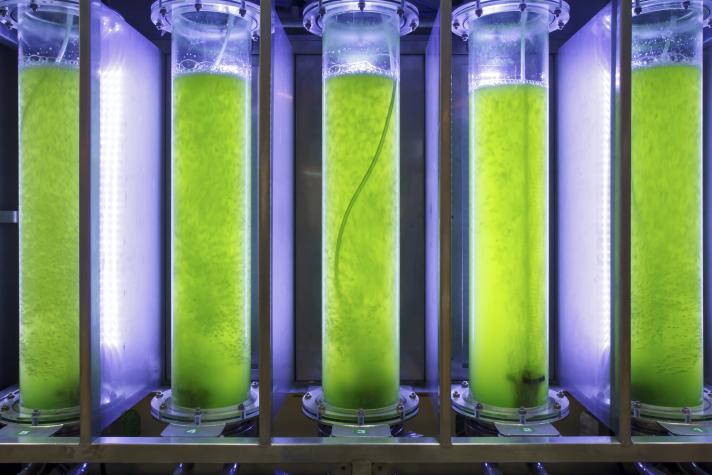Microalgae, which play a vital role in ocean ecosystems, are being heralded as a sustainable raw material in food, supplements, animal feed, and a range of non-food uses including bioplastics.
But the key challenge for scaling up the use of algae-derived products is the production costs; they need to come down and effective biorefinery technologies need to be developed. The EU-backed MIRACLES project thinks it has a solution … several, in fact.
A rich source of proteins, oils, polysaccharides and other added-value compounds including natural colourants, anti-oxidants, and bioactive ingredients, the tiny specks of algae that grow naturally in our oceans are a potential bio-economic boon.
Technically, the algae can be grown on land (even poor land like deserts) using a combination of seawater, nutrients and CO2 obtained from flue-gas or concentrated from the air – a technology successfully developed in the MIRACLES project. This means algal biorefineries are a serious option for regions with limited biomass and extreme climate conditions. But first, cost-effective solutions are needed to generate sufficient volumes of algae with the right characteristics for the many different uses.
MIRACLES, which was funded under the EU’s Seventh Framework Programme (FP7) for research and innovation, took up that challenge in 2013. Over the next four years, it developed new technologies and a range of specialty products supported by business models, marketing tools, and complete with environmental and societal impact assessments. Although further work is needed to fully demonstrate these outputs at industrial scale, the team firmly established the commercial case for microalgae across a number of applications.
Patently clever solutions
Technological innovations were achieved on the level of CO2 concentration from the air and algal production, harvesting and extraction processes, with significant cost-reduction potential reported in three types of biorefineries designed, tested and optimised to exploit algae biomass.
The MIRACLES team established the profit point on several specific applications in food, feed and industrial markets. And research was carried out to better understand the societal benefits of algae cultivation and use, as well as consumer attitudes and expectations concerning algae-based products.
Patents on the novel algal biorefining technologies and applications are pending, according to MIRACLES’ coordinator, Hans Reith of WU Agrotechnology & Food Sciences in the Netherlands, and he says a range of exploitable results and know-how are available to interested parties. New commercial ventures and follow-up projects are also being considered.
“The multi-product biorefinery scenarios show that this approach should be further developed and applied to other algae strains and products in order to promote this really promising sector of the bioeconomy,” confirms Dr Reith.
Feeling blue … in a good way
Europe’s ‘blue’ economy is estimated to contribute some 5.4 million jobs and generate gross added value of around €500 billion per year. The EU’s Blue Growth Strategy is thus geared towards further promoting long-term, sustainable growth in the marine and maritime sectors.
Dr Reith credits the depth and breadth of the 26-partner consortium, including prominent research organisations, industrial leaders, SMEs and end users, for MIRACLES’ strong contribution to this Strategy.
“Through cost-savings and value-creation, our integrated technologies can help scale up growth of the algae biorefinery sector, both large and small players, boost European marine biotechnology and the aquaculture industry, and make Europe’s wider blue bioeconomy more attractive to investors,” he concludes.
More info & acknowledgements
The MIRACLES project has received funding from the European Union’s FP7 for research, technological development and demonstration under grant agreement No. 613588. The final publishable report and all project publications will be available on the project website.

